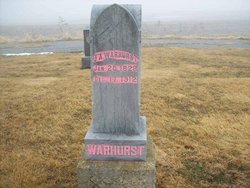Published in Dallas Trees blog on May 27, 2011.
As I have dedicated most of my spare time of late to genealogical research, I decided I wanted a common place of vision from which to stand to reflect back on my forest of ancestors. Hey, I like trees. I cannot judge them as a people who had displaced and made war against native people, or even their own brothers and cousins. I cannot judge some of them individually for the enslavement of others. I did not know these people. I cannot judge them for how they viewed the world, ignorant of some realities or choosing not to see others. It's not my place. It's my place to learn and grow from their experiences and help make my own part of the world a better place.
My family came from places like Howards Mill, Kentucky, Spring Creek, Nebraska, or Ward's Grove, Illinois. They lived in small communities like Mount Holly, Brandywine, Fair Play, Oswego, Stamford, Ripley, Mississippi, and Rupert, Vermont. I needed a simple perspective from which to view their world as they might have taught their children - on their farms, in their towns, in their small country schools, and in their churches. These people only knew of family, community, and survival in harsh conditions, and at times, against the odds. They knew how to do much that was handed down to them through previous generations and supportive families. Much of that is lost to most of us, but still hang on in the skills and fortune of a few. However, their experiences were not mine. I am in a period of relearning all that I have unlearned or had never inherited from centuries of growth. I recently remembered an old book on my shelf and I thought that to know the past, I need to read from it.
Harold Bell Wright is most recognized today for his novel, The Shepherd of the Hills. However, in the early 20th Century, he wrote other novels, including Their Yesterdays, which was more a grouping of essays than an actual novel. But publishing companies, being as they are, sold it as another great romantic novel from this writing pastor. Their Yesterdays is available online and in various formats. I have read it from a hardback book that was shared by someone who held it in their hands a hundred years ago. Wright had reason to hate the world from his youth, but he found a different perspective and published it. These are the common themes that stay in my mind as I look back to my yesterdays.

"There was a man.
And it happened--as such things often so happen--that this man went back into his days that were gone. Again and again and again he went back. Even as every man, even as you and I, so this man went back into his Yesterdays.
Then--why then there was a woman.
And it happened--as such things sometimes so happen--that this woman also went back into her days that were gone. Again and again and again she went back. Even as every woman, even as you and I, so this woman went back into her Yesterdays.
So it happened--as such things do happen--that the Yesterdays of this man and the Yesterdays of this woman became Their Yesterdays, and that they went back, then, no more alone but always together.
Even as one, they, forever after, went back.
What They Found in Their Yesterdays
And the man and the woman who went back into Their Yesterdays found there the Thirteen Truly Great Things of Life. Just as they found these things in their grown up days, even unto the end, so they found them in Their Yesterdays.
Thirteen Truly Great Things of Life there are. No life can have less. No life can have more. All of life is in them. No life is without them all.
Dreams, Occupation, Knowledge, Ignorance, Religion, Tradition, Temptation, Life, Death, Failure, Success, Love, Memories: these are the Thirteen Truly Great Things of Life--found by the man and the woman in their grown up days--found by them in Their Yesterdays--and they found no others.
It does not matter where this man and this woman lived, nor who they were, nor what they did. It does not matter when or how many times they went back into Their Yesterdays. These things are all that they found. And they found these things even as every man and woman finds them, even as you and I find them, in our days that are and in our days that were--in our grown up days and in our Yesterdays.
And it is so that in all of these Thirteen Truly Great Things of Life there is a man and there is a woman."
THE THIRTEEN TRULY GREAT THINGS OF LIFE
DREAMS
OCCUPATION
KNOWLEDGE
IGNORANCE
RELIGION
TRADITION
TEMPTATION
LIFE
DEATH
FAILURE
SUCCESS
LOVE
MEMORIES
from Their Yesterdays, by Harold Bell Wright, 1912




